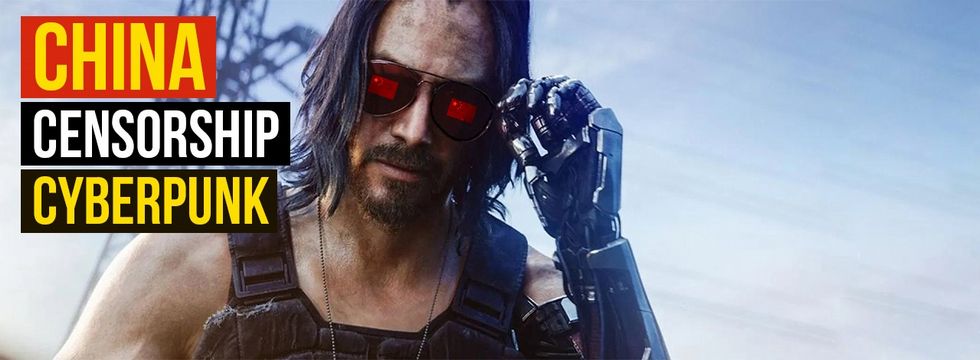author: Michael Chwistek
Tencent and Chinese Censorship of Video Games - A Growing Menace
Chinese censorship is like taxes. You notice it once a year, but it affects you constantly, is everywhere, and changes everything.
China is rather notorious when it comes to censorship. Especially in recent years, we have seen numerous cases of Western companies obeying the goalposts set in the PRC. This is true for the film industry as well as the gaming industry. The Polish CD Projekt was also involved in one of these recent events.
In the midst of the biggest image crisis in its history, CDP announced on its platform GOG that it was going to cancel the launch of Devotion. A small independent game that became famous for a joke about General Secretary of the Chinese Communist Party, Xi Jinping. As you can easily guess, the amount of backlash was significant. It was even criticized by the core fanbase, who didn't seem to mind the bugs in Cyberpunk 2077 and tried to support the developer by buying games on GOG. So, why did CD Projekt do it? There was a handful of people interested in that game arriving on GOG, and it's banning was announced by a big gaming website. What's it all about? To understand CD Projekt's decision, you have to be aware of just how far the Chinese influence goes, and how it all came about.
But this is not about CDP per se, nor Cyberpunk 2077. It's about a wider phenomenon, of which CD Projekt is just a small part of. Cyberpunk 2077 wasn't significantly trimmed down for the Chinese market, but there's no doubt that the market is key for CDPR, as well as many other publishers. This has its drawbacks, but there are many (not just financial) incentives. There's also certainly a moral aspect to the decision to pull Devotion from GOG.
Free market, our rules
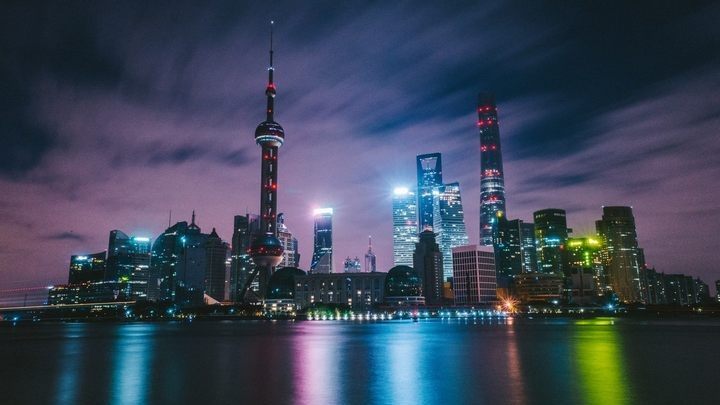
When most developing countries were adopting the principles of the Washington Consensus (economic policy recommendations for developing countries) without blinking an eye, China decided to take its own development strategy. On the one hand, it adheres to free trade rules enough to have been admitted to the World Trade Organization in 2001, but on the other, it controls its own market and support national companies as much as possible. Taking into account the sheer size and gravity of China, it's actually unlikely that it would be willing to give up international demand for its gargantuan production, and similarly, the rest of the world wouldn't give up access to the volumes of products coming from the country.
The situation may improve for European companies after the European Parliament ratified the China-Europe Investment Agreement (CAI). It assumes a greater opening of China to investment from the European Union, but it is still difficult to predict how this will translate to practice, and, in particular, the Chinese gaming market.
One such restriction was the frequent requirement to do business in China with a Chinese representative. For example, in order for World of Warcraft to be successful in China, Blizzard had to form a strategic partnership with a Chinese company. Currently, its official partner in is NetEase (also the co-producer of Diablo Immortal. This way, Chinese corporations not only get a share of the revenue, but, perhaps above all, get a lot of Western know-how. There's also significant engagement of the Chinese state, of course.
How how the USA and EU agreed to such terms? Again – it's about profit. Capitalism is all about them quarterly revenues. China is simply too big and important to play morality games when doing business with it. Though in the long run, Western companies and countries were losing out on the arrangement (helping to build future Chinese competitors), the short-term benefits were far more important to corporate CEOs and shareholders. What are the implications? China has some sort of influence on almost every major game in the world. Both direct and indirect.
Tencent goes shopping
The direct impact comes primarily through their giant companies that have invested, taken over, or established cooperation with most of gaming's big guns. League of Legends, Brawl Stars, Clash Royale, Path of Exile, Warframe, Call of Duty Mobile, PUBG Mobile, Fortnite. I could go on for a long time. All of these titles are largely owned, or even produced by Tencent. Tencent is one of the main companies constituting the Chinese equivalent of FAANG (Facebook, Apple, Amazon, Netflix and Google), i.e. BAT (Baidu, Alibaba, Tencent). The list of their subsidiary companies is growing by the month.
What does Tencent own? Here are some selected examples:
- Riot Games studio;
- Funcom studio;
- a Leyou company that includes Digital Extremes and Splash Damage studios;
- 84% of Supercell shares;
- 80% of Grinding Gear Games ;
- 40% of Epic Games ;
- 22.63% of Dontnod Entertainment shares;
- 9% of Frontier Developments shares;
- 5% of Activision Blizzard ;
- 5% of Paradox Interactive shares;
- 5% of Ubisoft's .
Tencent is a powerhouse that only Microsoft can match. Just to get the scale, consider the following: Activision Blizzard's stock market capitalization is $70.66 billion (as of December 28, 2020). Tencent is 759 billion (as of November 6, 2020). The American giant is like a mouse next to the Chinese giant. Of course, games are only part of Tencent's business, but in a much more significant way than Western companies like Amazon or Facebook.
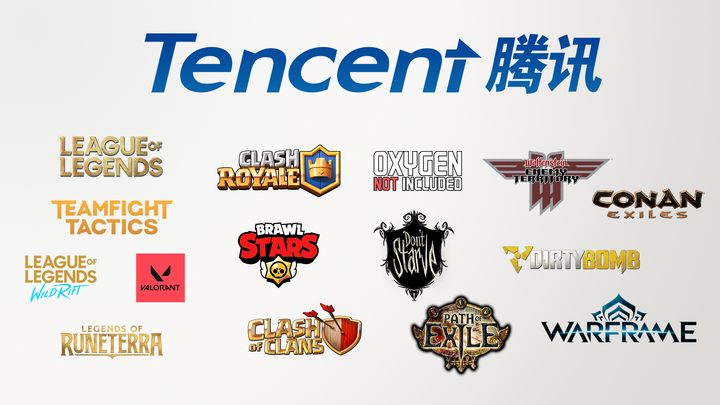
Tencent, and other Chinese companies are certainly bound by national censorship, but they don't have to impose it on the studios they buy. They very quickly censor themselves. Not always entirely consciously. Imagine NetEase approaching Bungie with an offer of investing $100M in their new project (which they did). A game set during Hong Kong protests is unlikely going to be their next release. Most devs may not even realize that such self-censorship exists until someone comes up with the idea of having a Winnie the Pooh easter egg.
A lever for censorship
The power of Chinese companies is one thing, but equally powerful, if not more powerful, is the indirect influence of the huge Chinese market and population.
I remember people scorning the fact that there were no skeletons in the Chinese version of World of Warcraft or Dota 2 because they were censored. As it turned out, it was a myth. No one had banned any skeletons. But China's censorship rules are so vague and general that Western companies have removed the skeletons off their own accord to minimize any risks. However, a lot has changed since.
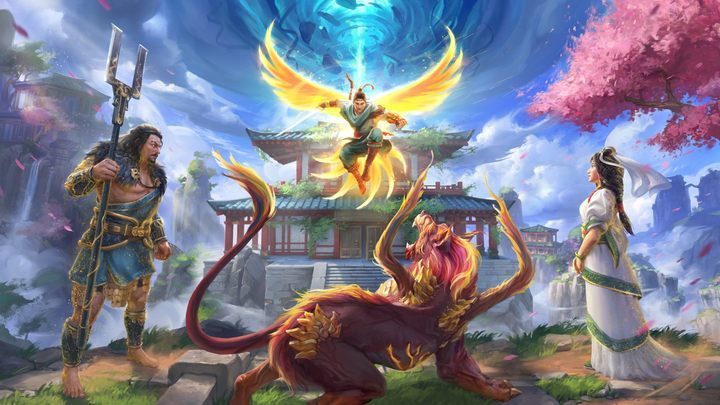
China has become an important market for many publishers that many games are created with precisely the Chinese players in mind from the very beginning. Even before the release of Immortals: Fenyx Rising, French Ubisoft has announced a major expansion pack dedicated to the mythology of China. Now consider the following: You start developing a game, and since the onset, it's clear that China is one of the most important target audiences. Are you going to risk losing hundreds of thousands, perhaps millions of consumers over making Winnie the Pooh jokes?
Of course, it's just a metaphor, but I'm sure that almost every AAA game released in recent years has taken into account the restrictions specific for China. No CEO, nor investor would agree to give up such a huge market.
The reported censorship is just the beginning
This kind of self-censorship sometimes becomes revealed, but usually only when someone screws up. A perfect example is last year's trailer for Call of Duty: Black Ops – Cold War, which featured snippets of the Tiananmen Square protests.
Activision responded swiftly, removing the passage disliked by the Chinese from all language versions of the trailer. How many similar situations happened before the footage made it to the public? The censorship that the media is learning about is just the tip of a giant iceberg, and yet, China-related scandals in recent years have been few, although high-profile.
Steam and Chinese nationalists
All right. Western publishers are adapting to Chinese censorship, but to what end? After all, China has long used a system whereby every game must be licensed by a government commission – and only a fraction of games from other countries actually obtain such license. You can find a list of all foreign games that have been approved for distribution in China in 2020here and here. It's hard to find any major PC or console hits there. So, why are Western companies self-censoring for the Chinese market? There are two answers: Steam and the Chinese.
The Valve store breaks new records for the number of active users almost every year. This is due in large part to the great popularity and very strange status of Steam on the Chinese internet. While all games coming to the Chinese market require a government license, the same rule does not apply to titles offered on Gabe Newell's platform. Any game can be available there, and for some reason, no one has banned Steam yet. Quite the opposite. Since 2018, Valve has been working with China's Perfect World to launch a special Chinese version of the store (it was recently announced it will launch in early 2021). It will, of course, offer only the games approved by the Party, though it is still unclear whether it will exist alongside, or rather instead of the global version of the store. Anyway – Steam is still available in China and there's no official censorship there. However, there's something worse than state-run censorship. And it's arguably user-level, nationalist censorship.
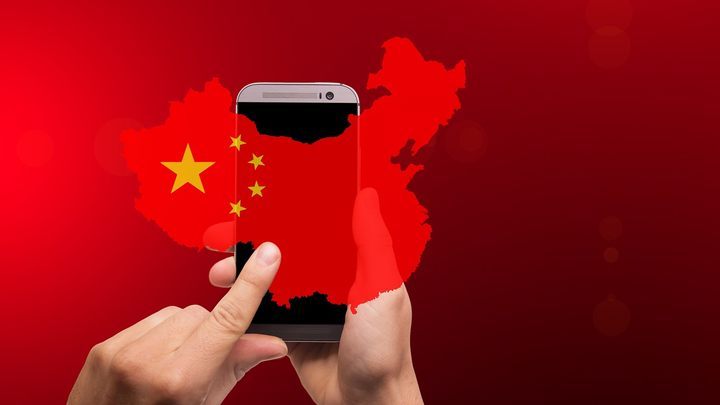
Some time ago, there was a big war between Chinese and Korean players on the Internet. The reason was the game Shining Nikki, which involves dressing beautiful women in beautiful outfits. Its creators, a Chinese company Paper Games, decided to provide players with a special set of traditional Korean hanbok clothes at the launch of Korean servers. This was very much disliked by the Chinese players. They recognized that hanbok is just a copy of historical clothes from China, so they should not be called Korean. The intensity of the Chinese backlash was so great it led the publisher to shut down the game's Korean servers and publish an official apology.
This point serves only to illustrate how deeply nested nationalism can be in regular people of China. They are the strongest weapons of Chinese censorship, and it is their opinions, rather than the approval of government censors, that Western companies must look to obey.
China loves The Witcher and Cyberpunk
It's time to return to the main point. Why did GOG do it? Why did it first announce the release of Devotion and then changed heart? And all this at a time of image crisis caused by the at least suboptimal condition of the old-gen version of Cyberpunk 2077. Finally, GOG ltd. and CD Projekt RED belong to the same capital group, and for many customers both entities are rightfully one and the same thing.
The first mistake from CD Projekt's point of view was the very announcement of Devotion's release on GOG. Was this due to lack of research? Perhaps communication within the corporation has failed? Or maybe the initial plan was to release the game a few months after the release of Cyberpunk, which, as we well know, was postponed numerous times? The real answer will probably never be revealed. Instead, we can surmise the reasoning behind the decision to finally take Devotion down from the store.
CD Projekt couldn't afford to alienate Chinese players at the time of the biggest release in the studio's history. Even if it were to cost him a small image crisis in the West. The Chinese make up too large a portion of CDP's customers. Just look at the numbers.
SteamSpy, which collects data regarding Steam, unfortunately doesn't provide the number of copies of games sold by country, but paid account holders can see the number of players active on a given day by their geolocation. Below, you can see a graph of this parameter for The Witcher 3. The green line is China, the blue line is the US, and the purple line is the rest of the world. At peak activity, the Chinese made up over 50% of the players.
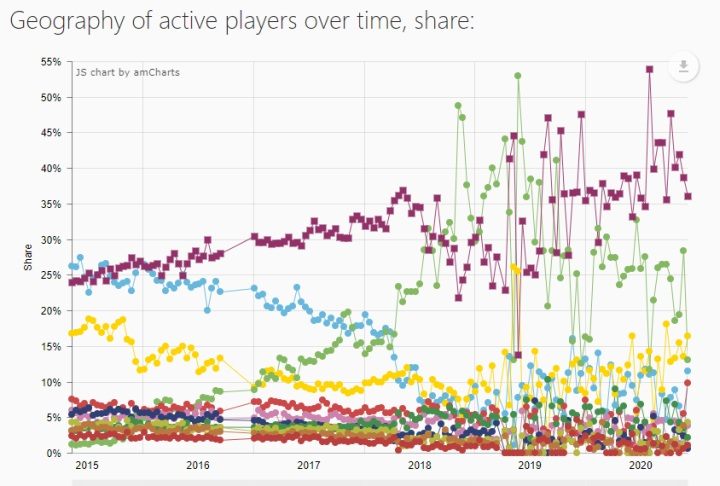
The same graph for Cyberpunk 2077 isn't quite reliable yet, as it covers a fairly short period, but it shows that approx. 30% of active players were Chinese. Anyway, just turn on Cyberpunk tab on Steam and change the display comment settings to all languages. A very large part of the front page is in Chinese.
A post on LinkedIn by one of CD Projekt's employees (since deleted) was also a reliable source of information, which states that at one point, the number of Cyberpunk 2077 pre-orders in China was the highest in the world. We also know that Cyberpunk 2077 on release day was watched by over 19 million people on Chinese streaming platforms.
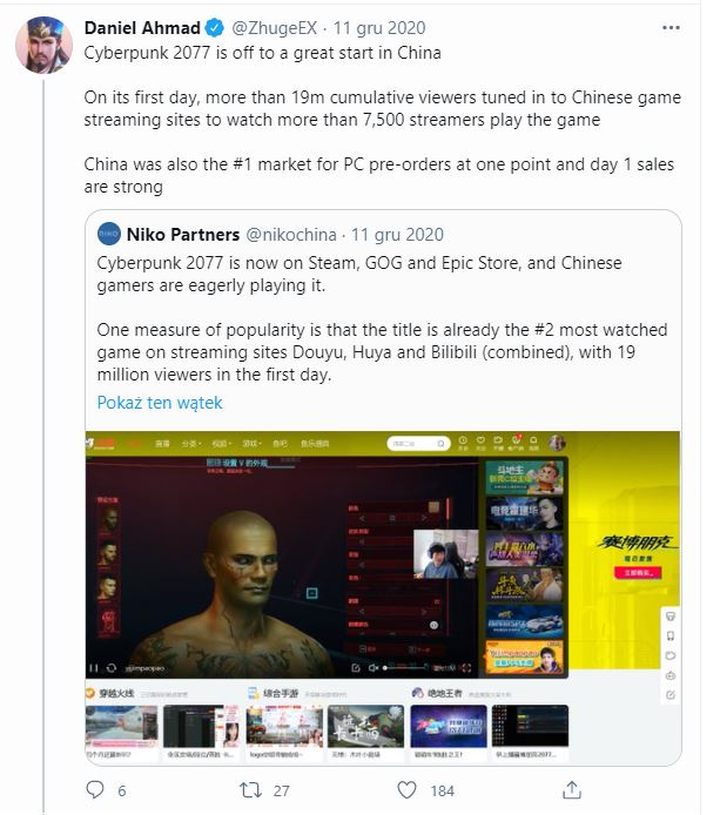
Cyberpunk 2077 and The Witcher 3 are exceptions. Similar charts on SteamSpy can be found for games like Red Dead Redemption II (below) and GTA V.
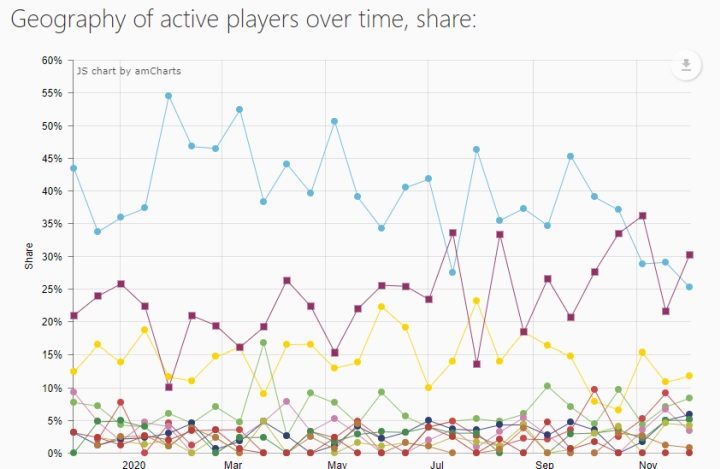
The experience of indie creators also confirms this. China can account for between 10% and 20+% of copies sold on Steam. CD Projekt's productions seem to be in the upper range of these estimates, as they have been very popular among Chinese players. However, keep in mind that game prices in China are lower than in the West and returns are much more common, too. This often means that the relation between copies sold and profits made is a bit less appealing than elsewhere.
It pays off, but does it in the long run?
Knowing all these facts and the huge influence of the Chinese market on publishers' profits, CD Projekt's decision seems very logical. It is also not surprising that the developers put so much emphasis on the PC version (consoles are almost non-existent in China, except for the Switch) and the graph presenting the number of pre-orders by platform (though let's also bear in mind that, according to CD Projekt 's CFO Piotr Nielubowicz, PC gamers are more likely to pre-order, while users of consoles are more likely to buy games upon release). Until a few years ago, almost every AAA production sold much better on consoles than PC. China slowly reverses this trend.
CD Projekt's decision to take down Devotion to appease its Chinese fans seems completely justified from a financial perspective. I would not be surprised if the Chinese accounted for 15-20 percent of the company's customers, and that's a figure a listed company cannot afford to lose. However, there's another side to the coin.
The pursuit of profits counted in yuan, sometimes at the expense of Western players, may cause unpleasant hiccups in the future. If the global version of Steam ever gets banned in China, games like Cyberpunk 2077 won't stand much of a chance of getting a government approval. After all, the Party isn't instilling a vision of the future for our world under China's enlightened leadership just to let us play a gloomy game set in dark reality with a powerful Japanese corporation ruling it. It also steadily escalates the cold war between the U.S. and China, which could lead to a brutal rupture of the Internet into East and West. Western corporations (including CD Projekt), now strongly focused on conquering the Chinese market, should keep this in mind and make their decisions carefully.
